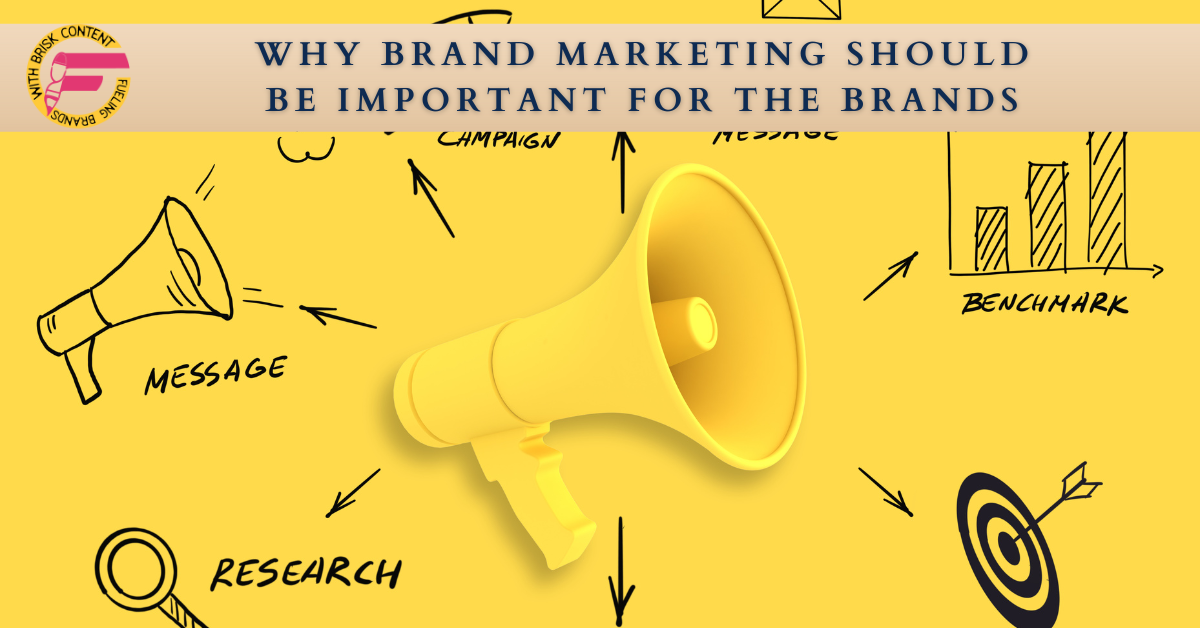Why Brand Marketing Should Be Important For The Brands
A study shows it takes at least 5-7 brand impressions for someone to remember a brand and 81% of consumers need to trust a brand before making any purchase.
This shows a brand needs to create such an identity or image in consumers’ minds that not only helps them in increasing brand recognition but also maintains their trust & loyalty of them in order to drive sales.
While you’re dealing with the ways how to make your business stand out in the market, there is surely a point when you get puzzled between the two most important terms of any business- Branding and Marketing.
So before moving forward, let’s dive into how branding and marketing differ from each other.
Difference between Branding & Marketing-
In nutshell, “Branding” is who you are. i.e., it’s all about your values, missions, or USPs that make you different from the competitors and lets you foster a deeper relationship with the customer, supplier, follower, or mere bystander. It’s about how the audience recognizes you through your brand’s key elements like the logo, website, tagline, symbol, brand tone of voice, and brand style.
To build awareness about your brand, you need a way to communicate with the audience about the products or services you’re offering. Here’s when “Marketing” enters into the picture to deliver and promote your brand’s message or identity with a strategy & tools to convert leads into customers. It helps you to clear the clutter, grab customers’ attention and get your brand in front of people.
What Is Brand Marketing?
Brand marketing is a strategic plan that helps in creating & growing a bond between consumers and the company. So, instead of promoting individual products or services your company offers, you can emphasize the brand as an entity or whole.
This helps in displaying the story your brand stands by, and further generates brand awareness, and builds reputation & recognition among target prospects to have a competitive advantage.
Your brand can use multiple channels for brand marketing strategy such as digital, social, or paid search advertising, but what works best is when you use a good mix of different channels
Brand marketing should be important for brands for several reasons:
The brand marketing strategy will help your brand to create a positive image and reputation in consumers’ minds. Here are some reasons why brand marketing is important for the brands:
1. Differentiation:
In this competitive era, the uniqueness your brand possesses can help you define and spread your identity, values, positioning, and propositions which in turn can attract customers and let them choose your brand more than anyone else’s.
To encourage engagement and spread awareness, a content marketing strategy can serve your brand with multiple opportunities where your content can grab the readers’ attention and let them interact with your brand. The more the audience resonates with your brand and ideas, the higher the chances of engagements, sales, and retention rate, and it in turn builds a community of loyal followers around the brand.
Example- When it comes to differentiation, the best example we can think of is the brand “Apple”. Apple differentiates its product by charging them higher and wants to imply that its products incorporate the latest frontline technology and better quality than the rest of its competitors.
They build a level of hype and interest in customers’ minds before any of their product launches through clever content marketing and distribution strategies. And since Apple has a long-time established reputation, brand equity for innovations, and commitment to designing new products, they have covered a large market share in its industry.
2. Trust and credibility:
If your brand is one among those who stand by its value, consistently deliver high-quality content/service, and have a positive brand image, well then you’ve already earned the trust and credibility of your customers.
Once you’ve gained customers’ trust, and they believe in the reliability of your product and feel confident about your brand, you’re going to retain them for the long term.
Example- Whenever the word delicious occurs, we all remember the slogan “Utterly Butterly delicious” and the iconic animated girl often seen on the covers of Amul dairy products. They focused solely on the mass market and became an integral part of the common man’s lives, by maintaining quality products at affordable prices to the consumers.
The brand “Amul” has always amazed audiences with its quirky meme-styled content & all those animated characters that make consumers feel engaging, relatable, and humorous and they never fail to publish their take on current scenarios. This proves that they majorly deliver customer-centric content and their awareness and care towards the environment, and so is an ideal brand example of content marketing strategy.
3.Loyalty:
When you address consumers’ needs and interests and provide accurate services, they will feel a sense of association while buying the product and remain more loyal to your brand. This will lead to consumers’ developing an emotional connection with your brand which will make them come to you again and again, thereby increasing the retention and advocacy level.
Example- Being among one of the leading brands with a wide fan base across the world, “Starbucks” has successfully managed to increase its sales, and retain and expand its loyal customers through some of its exemplary loyalty programs.
They deliver a unique experience with the “order & pay” feature that lets consumers quickly add their favorite items to the cart, and also suggests what beverage might pair up with their order. And if you’re one among them who uses the app, you might get to earn stars for money spent, which later gets converted into free treats.
4. Awareness:
Reaching out to more people, and communicating the brand’s key message through various marketing channels not only helps to drive consumers’ interest and attention towards the brand but also increases the chances of remembrance in their minds.
At this phase, Content marketing can help your brand by- attracting more audience on social media, generating traffic on your website, and improving organic ranking & customer retention rate.
Example- What word comes to your mind when you hear “Nike”? Empowerment, Courage, Motivation, and Innovation. Well, this is why people buy Nike’s products as they never sell you the products, but the attitude and identity you feel when you wear them.
From logos to campaigns to slogans and their content strategies, everything supports these terms. You go through any of their campaigns or ads, they always use the real stories and faces behind them covering all types of personalities, ages, races, and gender, and their ability to overcome obstacles.
5. Expansion:
The reputation and identity of a brand can help a company to expand itself in further product categories or sometimes even enter into a new market.
The already-established brand loyalty and credibility can help companies open new doors to opportunities and increase their visibility, customer base, engagements, and sales through content marketing strategy.
Example- One of the most well-known examples of this can be seen in the “Amazon” brand extension strategy, once which began as an online book retailer in 1994 and has now expanded its operations & offerings into a one-stop online shop. It now sells all kinds of products on its online platform and delivers services like music streaming, videos, artificial intelligence, cloud computing, and online advertising
The Takeaway
To thrive in this fast pace and ever-evolving competitive business world, you need to put forward a strong Brand marketing strategy. Without an effective Brand marketing strategy, you might be delivering a high-quality product, but will always carry a risk of losing or fading the memory of your brand image in consumers’ minds.






Do you mind if I quote a couple of your articles as long asI provide credit and sources back to your website?My blog site is in the very same niche as yours and my users would certainly benefit from some of the information you present here.Please let me know if this okay with you. Thanks!
I have read your article carefully and I agree with you very much. This has provided a great help for my thesis writing, and I will seriously improve it. However, I don’t know much about a certain place. Can you help me?
Your article helped me a lot, is there any more related content? Thanks! https://accounts.binance.com/ru-UA/register?ref=S5H7X3LP
Can you be more specific about the content of your article? After reading it, I still have some doubts. Hope you can help me.
Thank you for your sharing. I am worried that I lack creative ideas. It is your article that makes me full of hope. Thank you. But, I have a question, can you help me?
Thanks for sharing. I read many of your blog posts, cool, your blog is very good.
Thanks for sharing. I read many of your blog posts, cool, your blog is very good.
Your article helped me a lot, is there any more related content? Thanks!